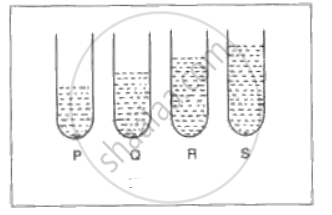Advertisements
Advertisements
प्रश्न
उत्तर
When an oscillatory system is made to oscillate under the action of an externally applied periodic force, it is said to execute forced vibrations. In this case the external frequency may or may not be equal to the natural frequency of the body.
In case of resonance, the externally applied periodic force has the same frequency as the natural frequency of oscillation of the given oscillatory system.
APPEARS IN
संबंधित प्रश्न
Name the phenomenon involved in tunning a radio set to a particular station
Define the Resonance phenomenon?
In the diagram below, A, B, C, D are four pendulums suspended from the same elastic string PQ. The length of A and C are equal to each other while the length of pendulum B is smaller than that of D. Pendulum A is set into a mode of vibrations

1) Name the type of vibrations taking place in pendulums B and D?
2) What is the state of pendulum C?
3) State the reason for the type of vibrations in pendulum B and C.
(i) Define resonant vibrations.
(ii) Which characteristic of sound, makes it possible to recognize a person by his voice without seeing him?
In fig. , P, Q, R and S represent test tubes each of height 20 cm which are filled with water upto heights of 10 cm, 14 cm, 16 cm and 18 cm respectively. If a vibrating tuning fork is placed over the mouth of test tube Q, a loud sound is heard.
(i) Describe the observations with the tubes P, R and S.
(ii) Give the reason for your observation in each case.
(iii) State the principle illustrated by the above experiment.

Explain why stringed musical instruments, like the guitar, are provided with a hollow box.
What do you understand by free (or natural) vibrations?
What are the factors that affect the frequency of a vibrating string and how do they affect the frequency?
